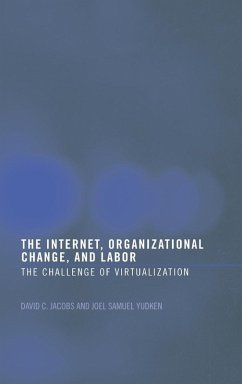How does this alter the capacity of individuals and groups to manipulate knowledge and ultimately to construct and manage organizations? Many managers will use the Internet as a means to reduce labor costs. They will rely increasingly upon contingent employees who lack benefits and offices, and work from home. These employees will know little about the treatment of their co-workers and will have little power to compel improved treatment. Another possibility is that the Internet will enhance the potential of production by democratic networks of skilled craftsmen who exchange designs by e-mail and edit them on their personal computers. Traditional managers will oppose this vision of organizational reform, but others may find that quality and flexibility are enhanced by this approach.
As we devote increasing amounts of time time at work and at home to the Internet and computer networks, our daily lives are dramatically being reshaped. We are better informed and can work more efficiently, yet there is anxiety about the security of our jobs. Examining what is happening to work, organizations and unions in the age of the Internet, this fascinating book reveals both the opportunities and dangers for workers in the digital age. Exploring the Internet's impact on organizations and labor from complementary perspectives, Jacobs and Yudken consider how new digital technologies shape cultural change. They look at the culmination of the development of the Internet, its impact upon jobs and the current prospects for unions, and conclude that the Internet ultimately reduces transaction costs thereby aiding profit making, and also assists workers, consumers and citizens in challenging business practices. Ideal for students of management, e-business and human resource management, this informative text is a balanced analysis of the Internet aided workplace. Unlike many enthusiasts of e-commerce, it identifies dangers in the Internet-driven enterprise such as contingent employment, employee monitoring and job loss, and also explores the potential benefits for employees, proposing possible strategies for reforming the economy.
Hinweis: Dieser Artikel kann nur an eine deutsche Lieferadresse ausgeliefert werden.
As we devote increasing amounts of time time at work and at home to the Internet and computer networks, our daily lives are dramatically being reshaped. We are better informed and can work more efficiently, yet there is anxiety about the security of our jobs. Examining what is happening to work, organizations and unions in the age of the Internet, this fascinating book reveals both the opportunities and dangers for workers in the digital age. Exploring the Internet's impact on organizations and labor from complementary perspectives, Jacobs and Yudken consider how new digital technologies shape cultural change. They look at the culmination of the development of the Internet, its impact upon jobs and the current prospects for unions, and conclude that the Internet ultimately reduces transaction costs thereby aiding profit making, and also assists workers, consumers and citizens in challenging business practices. Ideal for students of management, e-business and human resource management, this informative text is a balanced analysis of the Internet aided workplace. Unlike many enthusiasts of e-commerce, it identifies dangers in the Internet-driven enterprise such as contingent employment, employee monitoring and job loss, and also explores the potential benefits for employees, proposing possible strategies for reforming the economy.
Hinweis: Dieser Artikel kann nur an eine deutsche Lieferadresse ausgeliefert werden.








